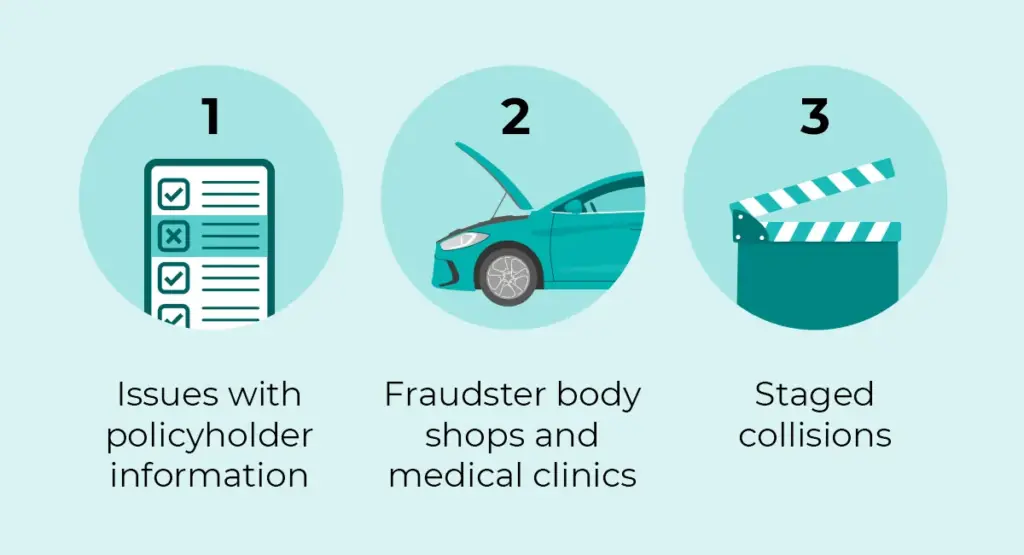According to a poll commissioned by the Financial Services Regulatory Authority of Ontario (FSRA), nearly 75% of respondents who had an auto policy believed that auto fraud is a prevalent issue in Ontario. 40% of those same respondents were worried they might become a victim.
Unfortunately, not everyone understands fraud as well as they should. Here’s some common insurance fraud scams and how they could be impacting you.

1. Issues or conflicting details with policyholder information
When someone lies or gives false information when applying for coverage to get a lower premium, that counts as insurance fraud.
This can happen in different ways. One of the most prevalent is people lying about their primary address.
Because insurance prices are rated by postal code, drivers living in areas such as Brampton, Vaughn, or elsewhere in the GTA may be faced with higher car insurance rates because traffic collisions and auto theft tend to be higher in those regions. Some citizens in these areas might state on their policy documents that they live at different address, perhaps in a more rural area, to qualify for lower insurance premiums.
How it affects you
The premiums that you pay contribute to a “pool” of money that insurance companies use to pay out claims. When policyholders lie about critical information, such as their primary address, they may pay less for their premiums, which is less money overall that goes into that pool. Insurers, by law, always need to have a certain level of funds to ensure they can pay for claims, which may be harder to do when not everyone’s paying the amount they should. As a result, they may raise premiums for everyone – even those that have been honest about their living situation, address, car usage, etc.
What you can do
Always ensure your primary address is correct and up to date on your insurance policy. Some brokers and insurance companies will use the term “garage address” over home address, which can be a little more helpful for individuals or families who might be between homes or who may live in multiple different locations at any point. Your policy should reflect the address where your vehicle resides more than 50% of the time. If you change provinces, it’s a government rule that you have 14 days (two weeks) to update your new address.
Due to rising fraud cases, insurers have been more diligent about investigating claims, and claims made far away from your primary address may signal adjusters to do a more thorough investigation. To hasten the claims process, try to be as cooperative as possible and provide your insurance company with whatever documentation they need to proceed. The sooner you comply, the likelier you are to get your settlement more quickly.
2. Fraudster body shops and medical clinics charging inflated rates for services
Not all perpetrators of insurance fraud are policyholders. In fact, some of them are third-party service providers, like contractors, autobody shops, and medical clinics.
These companies and individuals will take legitimate claims and inflate the costs they bill to insurance companies, alleging services that were never provided, repairs that were never done, etc. Some autobody shops may even intentionally delay service to increase the labour hours, costing the insurance company money and making you wait longer for your vehicle.
How it affects you
You can be involved in third-party fraud without even being aware of it. Your car could be involved in a scheme where a body shop charges your insurance company an inflated amount for repairs, some of which may not even have taken place. The same could be said of a fraudster medical clinics, who provides you with a legitimate service but charges the insurance company for services you didn’t even receive.
The more fraud that gets committed and the more falsified or inflated claims that are paid out, the more everyone pays. Year-over-year increases in premiums are a result of many things, but fraud is a huge contributor – whether you’re a perpetrator or not.
What you can do
Always use reputable stores, medical clinics, or any services that are “approved” by your insurance company. These companies have an agreement with your insurance company and are often more reputable when it comes to potential insurance fraud. They’re less likely to be involved in schemes when they have the favour of your insurance company potentially at stake. Reputable body shops may also have a faster turnaround time, be quicker with repairs, and you can get back on the road sooner.
There are sometimes benefits to using your insurance company’s preferred vendors, like a satisfaction guarantee, lifetime guarantee on repairs, etc. Be wary of shops that advertise the opportunity to waive your deductible in exchange for choosing their business. This is usually a red flag that the shop is going to pad their estimate that they later send to the insurance company.
3. Staged collisions, either with consenting parties or unwitting victims
Staged collisions are an example of premeditated fraud, which is fraud committed with the intention of receiving an insurance payout. Staged collisions generally involve multiple vehicles, often with all drivers being aware of the scam and consenting, but they can sometimes involve unwitting victims.
For example, a fraudster in their vehicle is driving through a parking lot as if they’re looking for a spot to park. You’re pulling out of a spot, and the fraudster waves you on. When you go to pull out, they quickly drive into you, making it seem like you didn’t look when pulling out.
Other examples of staged collisions include scenarios involving multiple fraudster vehicles where several participants file claims for exaggerated or non-existent injuries, or who use lemon vehicles (defective vehicles) to write off in accidents for settlement payouts.
How it affects you
As with any insurance fraud, all policyholders end up paying more for their premiums when fraudsters receive unwarranted claim payments. Unfortunately, though, staged collisions can cause victims more than just money. In scenarios where fraudsters hit unsuspecting third-parties, victims can suffer very real injuries. Plus, victims will have to go through the claims process themselves, may have to pay their deductible (in certain situations), or could even have to pay for the damages out-of-pocket if no coverage is available.
What you can do
Dash cams are your friend and can be a great asset when trying to prove that you weren’t at-fault for an accident, which can save you from having that on your insurance record and potentially later inflating your rates.
If you suspect you’re the victim of a staged collision, and assuming the accident didn’t take place in a totally remote area, try to flag down other vehicles and make use of witness statements. If you are the witness to another possible staged collision, don’t be a bystander. Be willing to step up for someone else. The more fraudsters we catch, the better off we all are.
For more questions about insurance fraud and how it may be impacting you, or general inquiries about auto insurance, please give us a call at Mitch Insurance.
Looking for car insurance?
Speak with a Mitch Insurance broker today to get a quote on Ontario auto insurance.
Call now
1-800-731-2228







